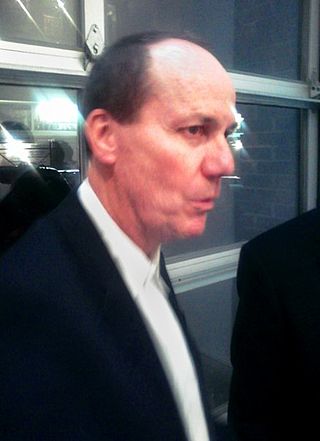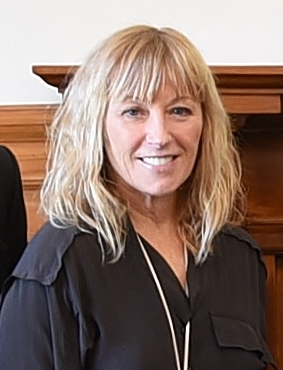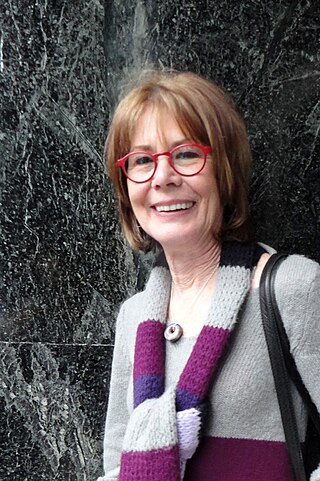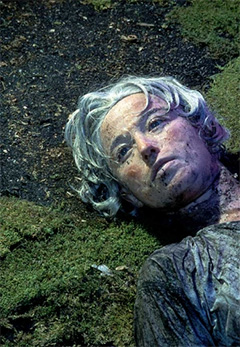
Richard Prince is an American painter and photographer. In the mid-1970s, Prince made drawings and painterly collages that he has since disowned. His image, Untitled (Cowboy), a photographic reproduction of a photograph by Sam Abell and appropriated from a cigarette advertisement, was the first rephotograph to be sold for more than $1 million at auction at Christie's New York in 2005. He is regarded as "one of the most revered artists of his generation" according to The New York Times.

Eve Arnold, OBE (honorary), FRPS (honorary) was an American photojournalist, long-resident in the UK. She joined Magnum Photos agency in 1951, and became a full member in 1957. She was the first woman to join the agency. She frequently photographed Marilyn Monroe, including candid-style photos on the set of The Misfits (1961).

Catherine Sue Opie is an American fine art photographer and educator. She lives and works in Los Angeles, as a professor of photography at the University of California, Los Angeles.

Cynthia Morris Sherman is an American artist whose work consists primarily of photographic self-portraits, depicting herself in many different contexts and as various imagined characters.

Louise Lawler is a U.S. artist and photographer living in Brooklyn, New York. From the late 1970s onwards, Lawler’s work has focused on photographing portraits of other artists’ work, giving special attention to the spaces in which they are placed and methods used to make them. Examples of Lawler's photographs include images of paintings hanging on the walls of a museum, paintings on the walls of an art collector's opulent home, artwork in the process of being installed in a gallery, and sculptures in a gallery being viewed by spectators.

Laurie Simmons is an American artist best known for her photographic and film work. Art historians consider her a key figure of The Pictures Generation and a group of late-1970s women artists that emerged as a counterpoint to the male-dominated and formalist fields of painting and sculpture. The group introduced new approaches to photography, such as staged setups, narrative, and appropriations of pop culture and everyday objects that pushed the medium toward the center of contemporary art. Simmons's elaborately constructed images employ psychologically charged human proxies—dolls, ventriloquist dummies, mannequins, props, miniatures and interiors—and also depict people as dolls. Often noted for its humor and pathos, her art explores boundaries such as between artifice and truth or private and public, while raising questions about the construction of identity, tropes of prosperity, consumerism and domesticity, and practices of self-presentation and image-making. In a review of Simmons's 2019 retrospective at the Museum of Contemporary Art, Chicago, critic Steve Johnson wrote, "Collectively—and with a sly but barbed sense of humor—[her works] challenge you to think about what, if anything, is real: in our gender roles, and our cultural assumptions, and our perceptions of others."

Suzy Lake is an American-Canadian artist based in Toronto, Canada, who is known for her work as a photographer, performance artist and video producer. Using a range of media, Lake explores topics including identity, beauty, gender and aging. She is regarded as a pioneering feminist artist and a staunch political activist.

The participation of women in photography goes back to the very origins of the process. Several of the earliest women photographers, most of whom were from Britain or France, were married to male pioneers or had close relationships with their families. It was above all in northern Europe that women first entered the business of photography, opening studios in Denmark, France, Germany, and Sweden from the 1840s, while it was in Britain that women from well-to-do families developed photography as an art in the late 1850s. Not until the 1890s, did the first studios run by women open in New York City.

Gertrud Arndt was a German photographer and designer associated with the Bauhaus movement. She is remembered for her pioneering series of self-portraits from around 1930.
Professor Jui-Chʻi Liu is a professor of Institute of Visual Studies, National Yang Ming Chiao Tung University, Taipei, Taiwan. She is the author of articles on women photographers and artists, published in Anglo-American journals and Taiwanese journals and books. Her research interests include gender and visual cultures, history of photography, history of (post)modern art, art theories, as well as feminist and critical theories.
Nancy Dwyer is an American contemporary artist whose works include paintings, works on paper, public art, word sculpture and furniture art. Her work has been exhibited widely at venues including the Whitney Museum of American Art, the Museum of Contemporary Art, Los Angeles, the Contemporary Arts Museum in Houston, the New Museum in New York and many others. Her work was included in the 2009 exhibition “The Pictures Generation” at the Metropolitan Museum of Art in New York, alongside the work of her peers and contemporaries, including Cindy Sherman and Robert Longo, with whom she cofounded Hallwalls in Buffalo, New York in 1974, as well as work by Barbara Kruger, Richard Prince, John Baldessari, Louise Lawler and Sherrie Levine, among others.
Tomoko Sawada is a Japanese contemporary feminist photographer and performance artist. She has been included in numerous group shows in Japan, Europe and the US. Her first solo exhibition was in 1997 at Japan's Gallery Chat. In 2004 she was awarded the prestigious Kimura Ihei Memorial Photography Award for Young Japanese Photographer as well as the International Center of Photography Infinity Award in the category of Young Photographer.

Untitled #153 is a color photograph made by American visual artist Cindy Sherman in 1985. In 2010, a print was auctioned for $2.7 million, making it one of the most expensive photographs ever sold at that time.

Eileen Cowin is a Los Angeles–based artist known for photography, video and mixed-media installations that draw on the language of mass media and art history and explore the relationship between narrative, fiction and non-fiction, memory and experience. Associated with the 1970s Los Angeles experimental photography scene and the Pictures Generation artists, her work combines familiar human situations and carefully chosen gestures, expressions and props to create enigmatic images whose implied, open-ended stories viewers must complete. Cowin has exhibited in more than forty solo shows in the United States and abroad, including at the Los Angeles County Museum of Art (LACMA), Museum of Contemporary Photography, Armory Center for the Arts and Contemporary Arts Center. Her work is included in more than forty institutional collections, including LACMA, the J. Paul Getty Museum, Brooklyn Museum, Art Institute of Chicago, San Francisco Museum of Modern Art (SFMOMA), and Smithsonian American Art Museum. She has been recognized with awards and commissions from the National Endowment for the Arts, LACMA, the City of Los Angeles (COLA), Public Art Fund, and the Sundance and USA film festivals. New York Times critic Andy Grundberg wrote that her multi-image work "sets up a tension between the familiar and the mysterious, creating a climate of implied danger, sexual intrigue and violence" in which clues abound to intimate various narratives. Jody Zellen observed that Cowin "manipulates the conventions of photography, film, and video to tell a different kind of story—one that explores where truth and fiction merge, yet presents no conclusions. Cowin's work provokes."

Hellen van Meene is a Dutch photographer known especially for her portraits.

Untitled Film Stills is a series of black and white photographs by American visual artist Cindy Sherman predominantly made between 1977 and 1980, which gained her international recognition. Sherman casts herself in various stereotypical female roles inspired by 1950s and 1960s films.
Stephanie, Cindy, Christy, Tatjana, Naomi, Hollywood is a black and white photograph taken in 1989 by photographer and director Herb Ritts. The subject of the photograph is a group of five women coyly entwined together in an embrace.

Untitled Film Still #48 is a black and white photograph taken by Cindy Sherman in 1979. It is part of her Untitled Film Stills photographic series, taken from 1977 to 1980. This picture is also known as The Hitchhiker.

Untitled #93 is a color photograph created by Cindy Sherman in 1981. It is part of her Centerfolds series of 12 photographs made for the Artforum magazine. They were never published there but went to be exhibited publicly the same year, to critical acclaim.















